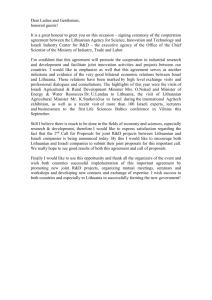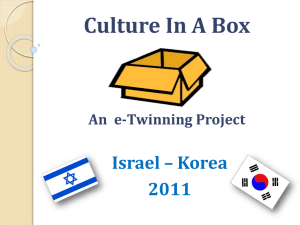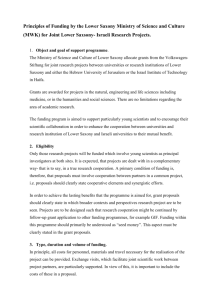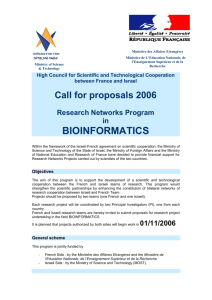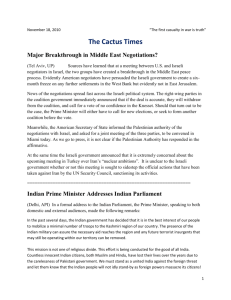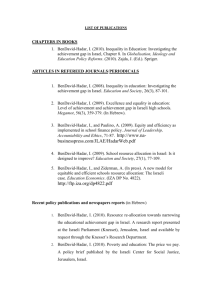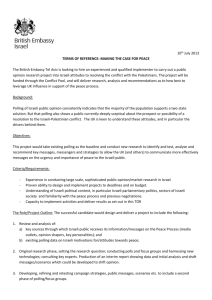state of israel india
advertisement
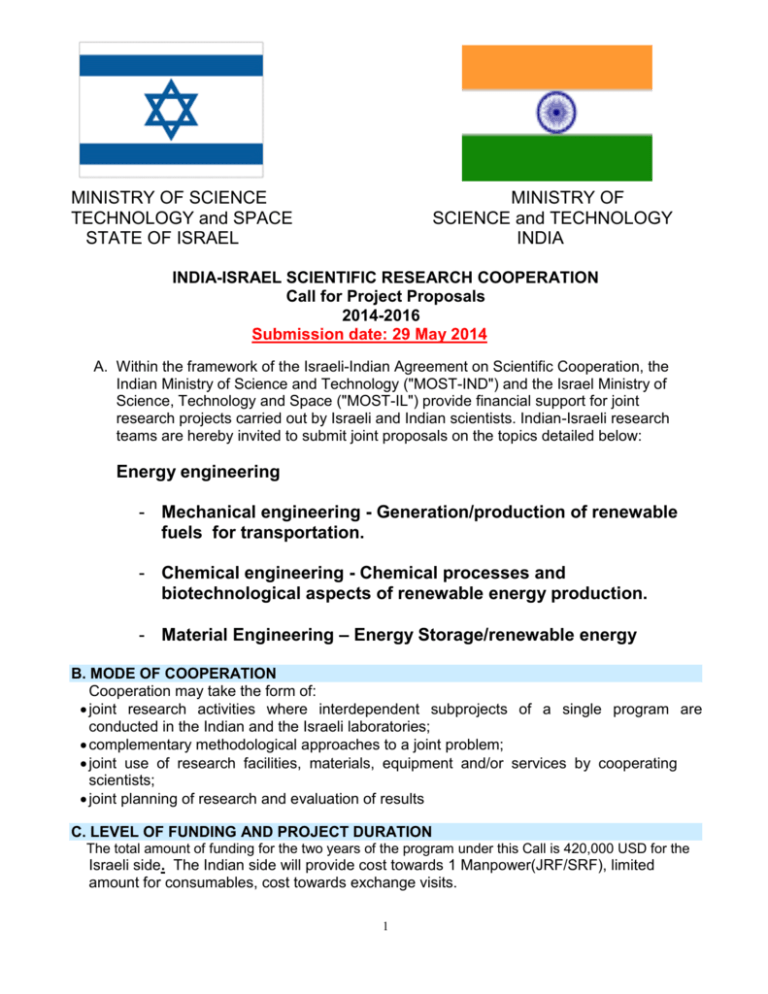
MINISTRY OF SCIENCE TECHNOLOGY and SPACE STATE OF ISRAEL MINISTRY OF SCIENCE and TECHNOLOGY INDIA INDIA-ISRAEL SCIENTIFIC RESEARCH COOPERATION Call for Project Proposals 2014-2016 Submission date: 29 May 2014 A. Within the framework of the Israeli-Indian Agreement on Scientific Cooperation, the Indian Ministry of Science and Technology ("MOST-IND") and the Israel Ministry of Science, Technology and Space ("MOST-IL") provide financial support for joint research projects carried out by Israeli and Indian scientists. Indian-Israeli research teams are hereby invited to submit joint proposals on the topics detailed below: Energy engineering - Mechanical engineering - Generation/production of renewable fuels for transportation. - Chemical engineering - Chemical processes and biotechnological aspects of renewable energy production. - Material Engineering – Energy Storage/renewable energy B. MODE OF COOPERATION Cooperation may take the form of: joint research activities where interdependent subprojects of a single program are conducted in the Indian and the Israeli laboratories; complementary methodological approaches to a joint problem; joint use of research facilities, materials, equipment and/or services by cooperating scientists; joint planning of research and evaluation of results C. LEVEL OF FUNDING AND PROJECT DURATION The total amount of funding for the two years of the program under this Call is 420,000 USD for the Israeli side. The Indian side will provide cost towards 1 Manpower(JRF/SRF), limited amount for consumables, cost towards exchange visits. 1 Support will be given for up to 7 joint projects (approximately 30,000 USD per year, per project for the Israeli side and approximately Rs. 15 lakhs per year, per project for the Indian side). Projects should be planned on a two year basis. Contracts will be signed accordingly. The final decision of the budget allocated to each project will be made at the final stage of the evaluation process, when the joint projects are chosen. Funding for the approved projects depends on the availability of funds in the State Budget of both countries. D. Eligibility 1. Projects must be conducted by collaborating Indian and Israeli scientific research teams. 2. Each research team must be led by a Principal Investigator from each country. 3. The Principal Investigator on each side must be affiliated with an academic institution, meaning – in Israel – an accredited institution of higher learning in Israel, according to the Council for Higher Education Law, 1958, or a public research institute with experience in the relevant fields. For the purposes of this Call a "public research institute" means a research institute whose main activity is the advancement of cutting-edge scientific knowledge, which possesses appropriate infrastructure and equipment and which employs researchers who, inter alia, publish articles related to their research in leading scientific journals and who present their research at international symposia. Industrial partners are encouraged to participate in research teams headed by Principal Investigators from an Academic Institution. 4. Each Principal Investigator and affiliated institution is accountable to MOST-IND or MOSTIL, respectively, for the execution of the project. 5.Proposals for which funding is approved, which include experiments with animals, must submit the approval of the relevant Committee for Experimentations on Animals before the project can commence. 6.Proposals for which funding is approved, which involve human beings, must submit the approval of the relevant Helsinki Committee before the project can commence. D1. ADDITIONAL PROVISIONS 1. It is strongly recommended that the Indian and Israeli research teams and their institutions enter into agreements regarding intellectual property rights prior to the start of collaborative activities. D2. SUBMISSION OF RESEARCH PROPOSALS For Indian research teams: Processing : The format for joint project proposals and other details are available at the websites: www.dst.gov.in one soft copy(word file) and 3 copies of the proposals may be submitted by Indian researchers in the prescribed format on or before the given deadline through proper channel to : 2 Dr. Naveen Vasishta, Director/Scientist ‘E’ International Division, Department of Science & Technology, Room No. 18-F, Technology Bhavan, New Mehrauli Road, NEW DELHI-110016 For Israeli research teams: Israeli Principal Investigators should submit proposals electronically in English using the attached Application Forms to the following Email: India@most.gov.il (in "pdf" or "doc" format) and in 6 hard copies by delivery to the following postal address of MOST-IL : Mr. Avi ANATI Deputy Director General for Planning & Control Ministry of Science, Technology and Space Clermont Ganneau St. 3, Kiryat Begin, Building 3, 3rd floor Jerusalem 91490 Tel: 02-5411170/3 Fax: 02-5823030 E-mail: avi@most.gov.il Application forms are available at the following internet addresses: www.dst.gov.in & http://www.most.gov.il/ A valid project application consists of all the required application materials from each side of a joint research team, being submitted, respectively, to the relevant Party to this Call. Therefore, in order for an application to be considered valid BOTH the Indian and Israeli research teams in a joint project must submit all the electronic applications (for both teams) and hard copy applications (for the Israeli team only) , including all the relevant materials and attachments which are required from each one of them under this Call by MOST-IND or MOST-IL respectively, to either MOST-IND or MOST-IL respectively by Thursday, 29 May 2014 at 15:00 (local time respectively in India or Israel). E. FUNDED EXPENSES Funding provided by this Call is intended to enhance joint collaboration between Indian and Israeli scientists. Funding will therefore be provided mainly in support of the collaboration vectors and of the local research that is necessary for the collaboration. For Indian researchers, funding can be provided by MOST-IND for: (1) salary for JRF / SRF etc. (2) Consumables; (3) Travel for the Indian scientists and visiting costs of the Israeli scientists and; (4) Joint seminars and workshops under the project 3 For Israeli research teams, funding can be provided by MOST-Il for: (1) Stipend or salary for PhD students, post-doctoral fellows, technicians and/or laboratory workers retained specifically for the purpose of the project for a temporary period of up to 2 years; (2) Consumables; (3) Small scale equipment; (4) Travel for the Israeli scientists and visiting costs for the Indian scientists; (5) Joint seminars and workshops; (6) Overhead expenses up to 15% of the total amount of the research project inclusive of the funds provided on the basis of this Call. Each budget item or expenditure for which reimbursement is requested must conform to the respective national rules of each applicant. F. MUTUAL VISITS Participating researchers are encouraged to spend an extended period of time visiting their counterparts’ institutions so long as such visits are an integral part of the research collaboration. International travel and living expenses of visiting scientists may be included in the project budgets. International travel costs should be included in the budget of the visiting side, while in-country living expenses should be included in the budget of the host side. Funding provided under this Call may only be used for visits that take place in India or Israel. G. Proposals Review After the evaluation of proposals is conducted by each of the program sponsors separately, MOST-IND and MOST-IL will jointly decide which projects will be funded and in what amounts based on the results of their independent evaluation and ranking. The projects will be assessed according to the following evaluation criteria: 1. Conformity with the designated research topics of this Call; 2. Capability of Principal Investigators (one for each country per research project): The Principal Investigator should have the experience, appropriate expertise and ability to manage the collaboration and carry out the project goals within the two-year project period; 3. Significance of the problem being addressed, and the potential impact of the proposed approach on solving it. (Proposals should address these issues explicitly and provide as much evidence as possible.); 4. Scientific merit, with emphasis upon the originality and novelty of the proposed research; 5. Clarity and quality of the research proposal itself – presentation of the topic, definition of research objectives, presentation of research methodology and detailed program of work; 6. Feasibility of the research plan and visitation program; 7. Practical applicability of expected research findings; 8. On-going research activity: The proposed collaboration should build on, reinforce and add significant value to on-going research activities in each research group. 9. Effectiveness and synergy of the proposed joint research activities. 4 Such activities are expected to have a significant impact on the scientific and technology development during the course of the Project or contribute to solving common issues. The scientists are expected to develop innovative technological seeds to trigger new industrial needs in the future. Activities that stem from synergy effects through the collaboration are highly valued. Such activities include (but are not limited to) those in which knowledge, know-how and skills of the other partner can be utilized for applications, and activities which can make best of resources and geographical features unique or proper to the respective counterpart. 10. Effectiveness and continuity of exchange – the proposal needs to contain activities to enhance sustainable research exchange. Relevant examples include: - Fostering young researchers through exchanges. - Sustainable development of the initiated knowledge exchange. - Expanding the international research networks among the researchers in general - Improving the presence of Indian or Israeli science and technology respectively in the counterpart country. 11. Justification of project budget. H. CONTRACTS, PAYMENTS AND REPORTS 1. The expected starting date for approved projects is November 2014. The expected completion date is two years after the starting date of the approved projects. 2. Contracts Upon approval of a particular project, separate contracts will be signed in India and Israel respectively, between MOST-IND and the institution of Indian Principal Investigator and between MOST-IL and the institution of Israeli Principal Investigator. 3. In principle, the project period is two years. However funding must be approved on an annual basis, with the funding for the second year to be approved in accordance with the provisions of the research contract. The parties to this Call reserve the right not to fund a second year of work for scientific-professional, administrative, budgetary or policy reasons. For the Israeli team: An application for the continuation of research funding for the second year must be submitted by the institution of Israeli Principal Investigator to MOST-IL on the appropriate forms at least two months prior to the end of the first year of the project together with the annual scientific report. 4. Payments/Sanction Order Payments will be made by MOST-IND and MOST-IL to the institution of each Principal Investigator, respectively, in keeping with the provisions of the contracts referred to above, according to the regulations and practices in force in each country. 5. Reports a) Financial Reports Financial reports will be submitted to MOST-IND or MOST-IL, respectively, by the institutions of each Principal Investigator as specified in the research contract. b) Scientific Reports Within two months (for Israeli team) and two months (for Indian team) after the conclusion of the project, each Principal Investigator will submit a full final report to MOST-IND or 5 MOST-IL, respectively, in accordance with the contract or the regulations in force in his/her country. In addition the Principal Investigators will submit a joint summary of the final report both to MOST-IND and MOST-IL in English. Additional interim progress reports may be required, according to the practices and regulations of each country, as specified in the research contracts I. SPECIAL PROVISIONS REGARDING THE ISRAELI APPLICANT All procedures and activities under this Call or the projects approved hereunder, including the eligibility of institutions via which applications must be filed, are subject to the standard MOST-IL Procedures Regarding International Collaborative Scientific Projects and Scholarships Funded by MOST-IL and to the MOST-IL Standard Contract for Scientific Projects (both documents referred to hereinafter as "the standard terms"). Applicants are required to familiarize themselves with the standard terms before filing an application under this Call; filing an application constitutes a declaration that the applicant has done so and agrees to be bound by the provisions thereof. In the event of any inconsistency between the terms of this Call and the standard terms, the terms of this Call will prevail. J. INFORMATION Additional information can be obtained from the following: INDIA Dr. Naveen Vasishta, Director/Scientist ‘E’ International Division Department of Science & Technology Room No. 18-F, Technology Bhavan New Mehrauli Road, NEW DELHI-110016 E-mail: nvasishta@nic.in ISRAEL: On administrative matters: Mr. Avi Anati Deputy Director General for Planning & Control Tel: 02-5411170/173/805 Fax: 02-5823030 E-mail: avi@most.gov.il 6 Mrs. Yehudith Nathan International Relations Tel: 02-5411145 Fax: 02- 5825725 E-mail: Yehudith@most.gov.il Ministry of Science, Technology and Space On scientific and administrative matters: Dr. Ela Strauss Director, Division of Chemistry, Materials Energy and nanotechnology E-mail: elas@most.gov.il Dr. Tareq Abu Hamed Director of Engineering Applied Sciences Research E-mail: tareqa@most.gov.il Ministry of Science, Technology and Space 7
